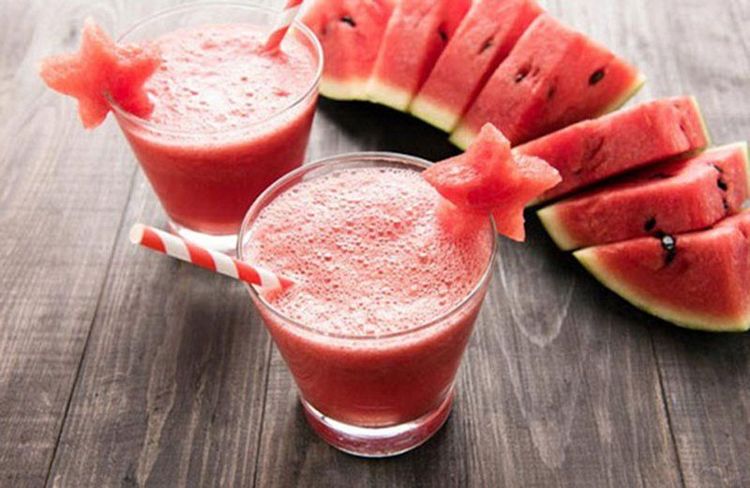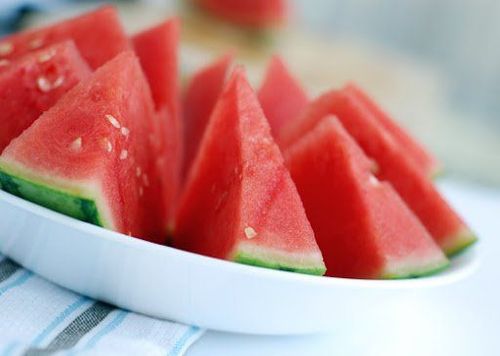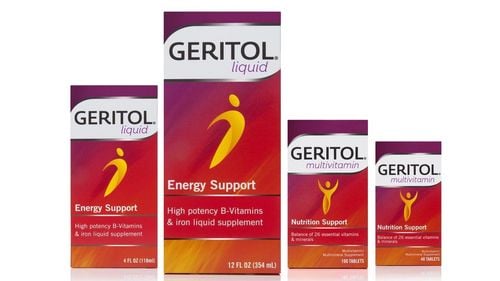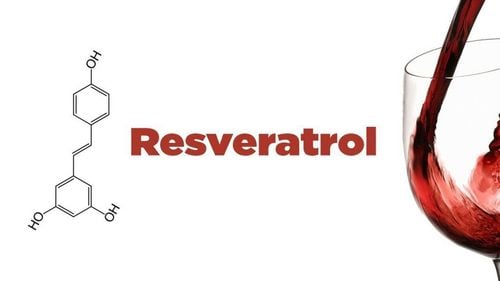This is an automatically translated article.
Watermelon is a fresh, delicious, cool and very healthy fruit. One cup of watermelon juice contains only 46 calories but provides a lot of vitamin C, vitamin A and healthy plant compounds. Watermelon in addition to nutritional value, they are also cheap and easy to find, so it is suitable for regular addition to the menu of the whole family.
1. Watermelon provides water for the body
Drinking water daily is the most important way to replenish water for the body. You can also eat foods with a high water content. The high water content in fruits and vegetables helps you feel full and provides a lot of vitamins and minerals. Interestingly, watermelon is 92% water. The combination of water and fiber in watermelon makes you feel full without providing as many calories as other foods, so watermelon also helps in weight loss.
2. Watermelon provides nutrients and beneficial plant compounds
Of the fruit family, watermelon provides the lowest calorie content. A 154-gram cup of watermelon provides only 46 calories, lower than other fruits like berries. A 154-gram cup of watermelon also contains many other nutrients including vitamins and minerals. Nutritional values in watermelon include:
Vitamin C: 21% of the recommended daily dose Vitamin A: 18% of the recommended daily dose

Dưa hấu chứa nhiều vitamin và dưỡng chất
Potassium: 5% of the recommended daily dose Magnesium: 4% of the recommended daily dose Vitamins B1, B5 and B6: 3% of the recommended daily dose Watermelon is also high in carotenoids, including beta-carotene and lycopene. In addition, it contains citrulline, an important amino acid. Here is an overview of watermelon's most important antioxidants:
Vitamin C: Vitamin C is an antioxidant that helps prevent cell damage from free radicals. Carotenoids: are a group of plant compounds including alpha-carotene and beta-carotene, which your body converts to vitamin A. Lycopene: Lycopene is a carotene that is not converted to vitamin A. Antioxidant This potent ingredient gives plant foods their red color like watermelon or tomatoes and has been linked to many health benefits. Cucurbitacin E: Cucurbitacin E is a plant compound with antioxidant and anti-inflammatory effects. Bitter melon, a relative of watermelon, contains even more cucurbitacin E.
3. Watermelon contains many compounds that may help prevent cancer
Scientists have studied that lycopene and other individual plant compounds in watermelon have anti-cancer effects. Although lycopene intake is thought to help reduce the risk of some types of cancer, research results have been mixed. Several studies have shown that lycopene has the ability to reduce cancer in the digestive system, by reducing insulin-like growth factor (IGF), a protein involved in cell division. If the IGF level is high, it can lead to cancer.
In addition, cucurbitacin E in watermelon has been shown to inhibit tumor growth.

Dưa hấu chứa nhiều hợp chất có thể giúp ngăn ngừa ung thư
4. Watermelon improves heart health
Heart disease is the number one cause of death worldwide. Dietary lifestyle changes can reduce the risk of heart attack and stroke by lowering blood pressure and cholesterol levels.
In addition, several other nutrients in watermelon have specific benefits for heart health. Studies show that lycopene can help lower cholesterol and blood pressure. In obese people, postmenopausal women, and some men, lycopene helps reduce the stiffness and thickness of artery walls.
Watermelon also contains citrulline, an amino acid that can increase nitric oxide levels in the body. Nitric oxide helps your blood vessels widen and lowers blood pressure. The other vitamins and minerals in watermelon are also good for your heart. These include vitamins A, B6, C, magnesium and potassium.

Dưa hấu có tác dụng ngăn ngừa bệnh đột quỵ
5. Watermelon Reduces Inflammation and Oxidative Stress
Inflammation is a major cause of many chronic diseases. Watermelon may help reduce inflammation and oxidative damage, as it is rich in the anti-inflammatory antioxidants lycopene and vitamin C.
In a human study when lycopene-rich tomato juice was supplemented with vitamin C, markers Their inflammation was reduced and antioxidant intake increased. Watermelon is rich in both lycopene and vitamin C. As an antioxidant, lycopene may also benefit brain health. For example, it may help delay the onset and progression of Alzheimer's disease.
6. Watermelon helps prevent macular degeneration
Lycopene is found in certain parts of the eye, helping to protect against oxidative damage and inflammation. It can also prevent age-related macular degeneration, a common eye problem that can cause blindness in older adults. Lycopene acts as an antioxidant and anti-inflammatory compound that can help prevent macular degeneration from developing and getting worse.

Dưa hấu giúp phòng chống thoái hoá điểm vàng
7. Watermelon helps relieve muscle pain
Citrulline, an amino acid in watermelon, can reduce muscle soreness. Watermelon juice enhances the absorption of citrulline.
One small study gave athletes watermelon juice alone, watermelon juice mixed with citrulline, or a drink consisting of only citrulline. Both drinks with watermelon resulted in faster muscle pain relief and faster heart rate recovery, compared to drinks containing citrulline alone.
The researchers also conducted an in vitro study investigating the absorption of citrulline. Results showed that citrulline absorption was most effective when it was consumed as an ingredient of watermelon juice.
In addition, scientists are also studying citrulline's potential to improve endurance and exercise performance. However, the results of the initial study did not show an association.
8. Good for skin and hair
Two vitamins in watermelon, A and C, are very important for skin and hair health. Vitamin C helps your body make collagen, a protein that keeps your skin smooth and hair strong.
Vitamin A is also important for skin health as it helps structure and repair skin cells. Without enough vitamin A, your skin can look dry and flaky. In addition, both the lycopene and beta-carotene in watermelon can help protect your skin from sunburn.

Vitamin A trong dưa hấu giúp làn da khỏe mạnh hơn
9. Watermelon improves digestion
Watermelon contains a lot of water and a small amount of fiber, both of which are important for maintaining a healthy digestive system. Eating fruits and vegetables rich in water and fiber, including watermelon, can be very helpful for promoting normal bowel movements.
Please dial HOTLINE for more information or register for an appointment HERE. Download MyVinmec app to make appointments faster and to manage your bookings easily.
Reference source: healthline.com













